Deck 7: Additional Topics in Trigonometry
Question
Question
Question
Question
Question
Question
Question
Question
Question
Question
Question
Question
Question
Question
Question
Question
Question
Question
Question
Question
Question
Question
Question
Question
Question
Question
Question
Question
Question
Question
Question
Question
Question
Question
Question
Question
Question
Question
Question
Question
Question
Question
Question
Question
Question
Question
Question
Question
Question
Question
Question
Question
Question
Question
Question
Question
Question
Question
Question
Question
Question
Question
Question
Question
Question
Question
Question
Question
Question
Question
Question
Question
Question
Question
Question
Question
Question
Question
Question
Question

Unlock Deck
Sign up to unlock the cards in this deck!
Unlock Deck
Unlock Deck
1/150
Play
Full screen (f)
Deck 7: Additional Topics in Trigonometry
1
Given  ,
,  , and
, and  , use the Law of Cosines to solve the triangle for the value of A. Round answer to two decimal places.
, use the Law of Cosines to solve the triangle for the value of A. Round answer to two decimal places.
A)
B)
C)
D)
E)
 ,
,  , and
, and  , use the Law of Cosines to solve the triangle for the value of A. Round answer to two decimal places.
, use the Law of Cosines to solve the triangle for the value of A. Round answer to two decimal places.A)

B)

C)

D)

E)


2
In the figure below,  ,
,  , and
, and  . Use this information to solve the parallelogram for . The diagonals of the parallelogram are represented by c and d. Round answer to two decimal places.
. Use this information to solve the parallelogram for . The diagonals of the parallelogram are represented by c and d. Round answer to two decimal places. 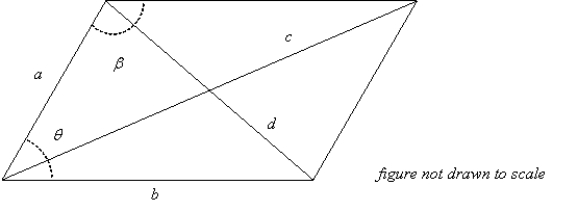
A)
B)
C)
D)
E)
 ,
,  , and
, and  . Use this information to solve the parallelogram for . The diagonals of the parallelogram are represented by c and d. Round answer to two decimal places.
. Use this information to solve the parallelogram for . The diagonals of the parallelogram are represented by c and d. Round answer to two decimal places. 
A)

B)

C)

D)

E)


3
Find the magnitude of vector v. 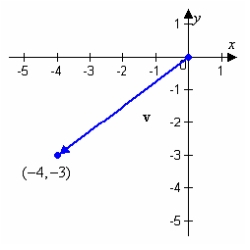

A)
B)
C)
D)
E)


A)

B)

C)

D)

E)


4
Using the figure below, sketch a graph of the given vector. [The graphs in the answer choices are drawn to the same scale as the graph below.] ![<strong>Using the figure below, sketch a graph of the given vector. [The graphs in the answer choices are drawn to the same scale as the graph below.] </strong> A) B) C) D) none of these E)](https://storage.examlex.com/TB8632/11eb7c21_425f_ee00_acd2_cd865c8ada29_TB8632_00.jpg)
![<strong>Using the figure below, sketch a graph of the given vector. [The graphs in the answer choices are drawn to the same scale as the graph below.] </strong> A) B) C) D) none of these E)](https://storage.examlex.com/TB8632/11eb7c21_425f_ee01_acd2_07abeb42aa83_TB8632_00.jpg)
A)![<strong>Using the figure below, sketch a graph of the given vector. [The graphs in the answer choices are drawn to the same scale as the graph below.] </strong> A) B) C) D) none of these E)](https://storage.examlex.com/TB8632/11eb7c21_425f_ee02_acd2_658f7799b9f0_TB8632_11.jpg)
B)![<strong>Using the figure below, sketch a graph of the given vector. [The graphs in the answer choices are drawn to the same scale as the graph below.] </strong> A) B) C) D) none of these E)](https://storage.examlex.com/TB8632/11eb7c21_4260_1513_acd2_f1cdac9eb4ce_TB8632_11.jpg)
C)![<strong>Using the figure below, sketch a graph of the given vector. [The graphs in the answer choices are drawn to the same scale as the graph below.] </strong> A) B) C) D) none of these E)](https://storage.examlex.com/TB8632/11eb7c21_4260_1514_acd2_a9d001e41112_TB8632_11.jpg)
D) none of these
E)![<strong>Using the figure below, sketch a graph of the given vector. [The graphs in the answer choices are drawn to the same scale as the graph below.] </strong> A) B) C) D) none of these E)](https://storage.examlex.com/TB8632/11eb7c21_4260_1515_acd2_dbb5b3f92823_TB8632_11.jpg)
![<strong>Using the figure below, sketch a graph of the given vector. [The graphs in the answer choices are drawn to the same scale as the graph below.] </strong> A) B) C) D) none of these E)](https://storage.examlex.com/TB8632/11eb7c21_425f_ee00_acd2_cd865c8ada29_TB8632_00.jpg)
![<strong>Using the figure below, sketch a graph of the given vector. [The graphs in the answer choices are drawn to the same scale as the graph below.] </strong> A) B) C) D) none of these E)](https://storage.examlex.com/TB8632/11eb7c21_425f_ee01_acd2_07abeb42aa83_TB8632_00.jpg)
A)
![<strong>Using the figure below, sketch a graph of the given vector. [The graphs in the answer choices are drawn to the same scale as the graph below.] </strong> A) B) C) D) none of these E)](https://storage.examlex.com/TB8632/11eb7c21_425f_ee02_acd2_658f7799b9f0_TB8632_11.jpg)
B)
![<strong>Using the figure below, sketch a graph of the given vector. [The graphs in the answer choices are drawn to the same scale as the graph below.] </strong> A) B) C) D) none of these E)](https://storage.examlex.com/TB8632/11eb7c21_4260_1513_acd2_f1cdac9eb4ce_TB8632_11.jpg)
C)
![<strong>Using the figure below, sketch a graph of the given vector. [The graphs in the answer choices are drawn to the same scale as the graph below.] </strong> A) B) C) D) none of these E)](https://storage.examlex.com/TB8632/11eb7c21_4260_1514_acd2_a9d001e41112_TB8632_11.jpg)
D) none of these
E)
![<strong>Using the figure below, sketch a graph of the given vector. [The graphs in the answer choices are drawn to the same scale as the graph below.] </strong> A) B) C) D) none of these E)](https://storage.examlex.com/TB8632/11eb7c21_4260_1515_acd2_dbb5b3f92823_TB8632_11.jpg)

Unlock Deck
Unlock for access to all 150 flashcards in this deck.
Unlock Deck
k this deck
5
Given  and
and  , determine
, determine  .
.
A)
B)
C)
D)
E)
 and
and  , determine
, determine  .
.A)

B)

C)

D)

E)


Unlock Deck
Unlock for access to all 150 flashcards in this deck.
Unlock Deck
k this deck
6
Given  ,
,  , and
, and  , use the Law of Cosines to solve the triangle for the value of C. Round answer to two decimal places.
, use the Law of Cosines to solve the triangle for the value of C. Round answer to two decimal places.
A)
B)
C)
D)
E)
 ,
,  , and
, and  , use the Law of Cosines to solve the triangle for the value of C. Round answer to two decimal places.
, use the Law of Cosines to solve the triangle for the value of C. Round answer to two decimal places.A)

B)

C)

D)

E)


Unlock Deck
Unlock for access to all 150 flashcards in this deck.
Unlock Deck
k this deck
7
A straight road makes an angle, A, of  with the horizontal. When the angle of elevation, B, of the sun is
with the horizontal. When the angle of elevation, B, of the sun is  , a vertical pole beside the road casts a shadow 8 feet long parallel to the road. Approximate the length of the pole. Round answer to two decimal places.
, a vertical pole beside the road casts a shadow 8 feet long parallel to the road. Approximate the length of the pole. Round answer to two decimal places. 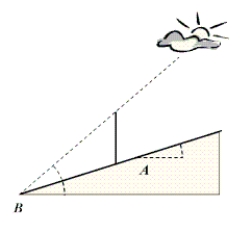
A) 10.20 feet
B) 3.30 feet
C) 6.27 feet
D) 6.63 feet
E) 12.32 feet
 with the horizontal. When the angle of elevation, B, of the sun is
with the horizontal. When the angle of elevation, B, of the sun is  , a vertical pole beside the road casts a shadow 8 feet long parallel to the road. Approximate the length of the pole. Round answer to two decimal places.
, a vertical pole beside the road casts a shadow 8 feet long parallel to the road. Approximate the length of the pole. Round answer to two decimal places. 
A) 10.20 feet
B) 3.30 feet
C) 6.27 feet
D) 6.63 feet
E) 12.32 feet

Unlock Deck
Unlock for access to all 150 flashcards in this deck.
Unlock Deck
k this deck
8
Given  ,
,  , and
, and  , use the Law of Cosines to solve the triangle for the value of B. Round answer to two decimal places.
, use the Law of Cosines to solve the triangle for the value of B. Round answer to two decimal places.
A)
B)
C)
D)
E)
 ,
,  , and
, and  , use the Law of Cosines to solve the triangle for the value of B. Round answer to two decimal places.
, use the Law of Cosines to solve the triangle for the value of B. Round answer to two decimal places.A)

B)

C)

D)

E)


Unlock Deck
Unlock for access to all 150 flashcards in this deck.
Unlock Deck
k this deck
9
Given  ,
,  , and
, and  , use the Law of Sines to solve the triangle for the value of a. Round answer to two decimal places.
, use the Law of Sines to solve the triangle for the value of a. Round answer to two decimal places.
A)
B)
C)
D)
E)
 ,
,  , and
, and  , use the Law of Sines to solve the triangle for the value of a. Round answer to two decimal places.
, use the Law of Sines to solve the triangle for the value of a. Round answer to two decimal places.A)

B)

C)

D)

E)


Unlock Deck
Unlock for access to all 150 flashcards in this deck.
Unlock Deck
k this deck
10
In the figure below,  ,
,  , and
, and  . Use this information to solve the parallelogram for b. The diagonals of the parallelogram are represented by c and d. Round answer to two decimal places.
. Use this information to solve the parallelogram for b. The diagonals of the parallelogram are represented by c and d. Round answer to two decimal places. 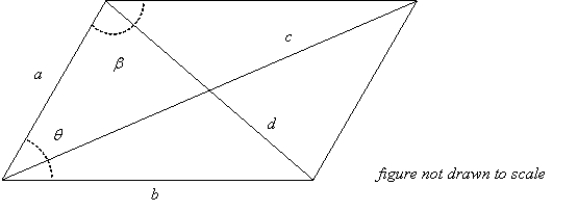
A) 6.33
B) 5.91
C) 9.27
D) 7.59
E) 2.54
 ,
,  , and
, and  . Use this information to solve the parallelogram for b. The diagonals of the parallelogram are represented by c and d. Round answer to two decimal places.
. Use this information to solve the parallelogram for b. The diagonals of the parallelogram are represented by c and d. Round answer to two decimal places. 
A) 6.33
B) 5.91
C) 9.27
D) 7.59
E) 2.54

Unlock Deck
Unlock for access to all 150 flashcards in this deck.
Unlock Deck
k this deck
11
Given  ,
,  , and
, and  , use the Law of Cosines to solve the triangle for the value of A. Round answer to two decimal places.
, use the Law of Cosines to solve the triangle for the value of A. Round answer to two decimal places. 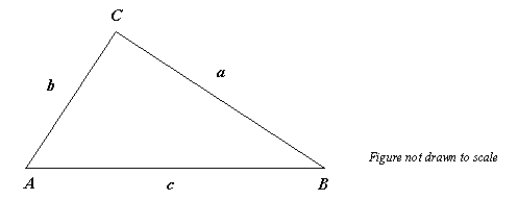
A)
B)
C)
D)
E)
 ,
,  , and
, and  , use the Law of Cosines to solve the triangle for the value of A. Round answer to two decimal places.
, use the Law of Cosines to solve the triangle for the value of A. Round answer to two decimal places. 
A)

B)

C)

D)

E)


Unlock Deck
Unlock for access to all 150 flashcards in this deck.
Unlock Deck
k this deck
12
Determine the area of a triangle having the following measurements. Round your answer to two decimal places. 
A) 22.20 sq. units
B) 24.67 sq. units
C) 19.73 sq. units
D) 29.60 sq. units
E) 27.13 sq. units

A) 22.20 sq. units
B) 24.67 sq. units
C) 19.73 sq. units
D) 29.60 sq. units
E) 27.13 sq. units

Unlock Deck
Unlock for access to all 150 flashcards in this deck.
Unlock Deck
k this deck
13
Given  ,
,  , and
, and  , use the Law of Cosines to solve the triangle for the value of C. Round answer to two decimal places.
, use the Law of Cosines to solve the triangle for the value of C. Round answer to two decimal places. 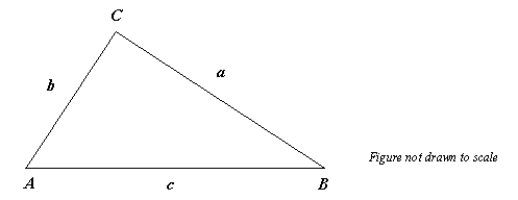
A)
B)
C)
D)
E)
 ,
,  , and
, and  , use the Law of Cosines to solve the triangle for the value of C. Round answer to two decimal places.
, use the Law of Cosines to solve the triangle for the value of C. Round answer to two decimal places. 
A)

B)

C)

D)

E)


Unlock Deck
Unlock for access to all 150 flashcards in this deck.
Unlock Deck
k this deck
14
Given  ,
,  , and
, and  , use the Law of Cosines to solve the triangle for the value of a. Round answer to two decimal places.
, use the Law of Cosines to solve the triangle for the value of a. Round answer to two decimal places. 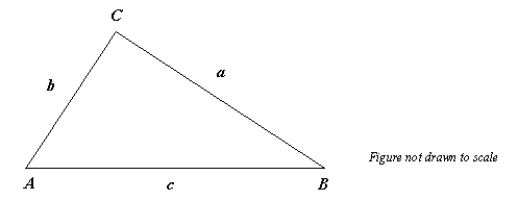
A) 14.32
B) 15.33
C) 13.31
D) 21.37
E) 17.34
 ,
,  , and
, and  , use the Law of Cosines to solve the triangle for the value of a. Round answer to two decimal places.
, use the Law of Cosines to solve the triangle for the value of a. Round answer to two decimal places. 
A) 14.32
B) 15.33
C) 13.31
D) 21.37
E) 17.34

Unlock Deck
Unlock for access to all 150 flashcards in this deck.
Unlock Deck
k this deck
15
Given  , use the Law of Sines to solve the triangle (if possible) for the value of c. If two solutions exist, find both. Round answer to two decimal places.
, use the Law of Sines to solve the triangle (if possible) for the value of c. If two solutions exist, find both. Round answer to two decimal places.
A)
B)
C)
D)
E) not possible
 , use the Law of Sines to solve the triangle (if possible) for the value of c. If two solutions exist, find both. Round answer to two decimal places.
, use the Law of Sines to solve the triangle (if possible) for the value of c. If two solutions exist, find both. Round answer to two decimal places.A)

B)

C)

D)

E) not possible

Unlock Deck
Unlock for access to all 150 flashcards in this deck.
Unlock Deck
k this deck
16
Given  ,
,  , and
, and  , use the Law of Cosines to solve the triangle for the value of c. Round answer to two decimal places.
, use the Law of Cosines to solve the triangle for the value of c. Round answer to two decimal places.
A) 17.88
B) 18.18
C) 15.73
D) 17.57
E) 16.96
 ,
,  , and
, and  , use the Law of Cosines to solve the triangle for the value of c. Round answer to two decimal places.
, use the Law of Cosines to solve the triangle for the value of c. Round answer to two decimal places.A) 17.88
B) 18.18
C) 15.73
D) 17.57
E) 16.96

Unlock Deck
Unlock for access to all 150 flashcards in this deck.
Unlock Deck
k this deck
17
Determine the area of a triangle having the following measurements. Round your answer to two decimal places. 
A) 33.24 sq. units
B) 29.91 sq. units
C) 39.89 sq. units
D) 26.59 sq. units
E) 36.56 sq. units

A) 33.24 sq. units
B) 29.91 sq. units
C) 39.89 sq. units
D) 26.59 sq. units
E) 36.56 sq. units

Unlock Deck
Unlock for access to all 150 flashcards in this deck.
Unlock Deck
k this deck
18
Given  and
and  , determine
, determine  .
.
A)
B)
C)
D)
E)
 and
and  , determine
, determine  .
.A)

B)

C)

D)

E)


Unlock Deck
Unlock for access to all 150 flashcards in this deck.
Unlock Deck
k this deck
19
In the figure below,  ,
,  , and
, and  . Use this information to solve the parallelogram for c. The diagonals of the parallelogram are represented by c and d. Round answer to two decimal places.
. Use this information to solve the parallelogram for c. The diagonals of the parallelogram are represented by c and d. Round answer to two decimal places. 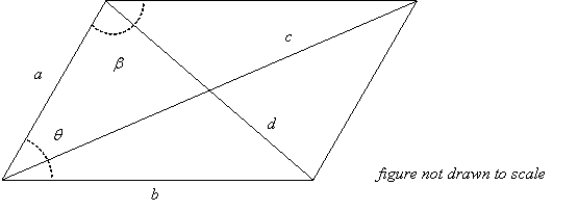
A) 9.12
B)
C) 5.87
D) 10.20
E) 11.64
 ,
,  , and
, and  . Use this information to solve the parallelogram for c. The diagonals of the parallelogram are represented by c and d. Round answer to two decimal places.
. Use this information to solve the parallelogram for c. The diagonals of the parallelogram are represented by c and d. Round answer to two decimal places. 
A) 9.12
B)

C) 5.87
D) 10.20
E) 11.64

Unlock Deck
Unlock for access to all 150 flashcards in this deck.
Unlock Deck
k this deck
20
Find the magnitude of vector v with initial point  and terminal point
and terminal point  .
.
A)
B)
C)
D)
E)
 and terminal point
and terminal point  .
.A)

B)

C)

D)

E)


Unlock Deck
Unlock for access to all 150 flashcards in this deck.
Unlock Deck
k this deck
21
Find the vector v that has a magnitude of  and is in the same direction as u, where
and is in the same direction as u, where  .
.
A)
B)
C)
D)
E)
 and is in the same direction as u, where
and is in the same direction as u, where  .
.A)

B)

C)

D)

E)


Unlock Deck
Unlock for access to all 150 flashcards in this deck.
Unlock Deck
k this deck
22
Given  ,
,  , and
, and  , use the Law of Cosines to solve the triangle for the value of a. Round answer to two decimal places.
, use the Law of Cosines to solve the triangle for the value of a. Round answer to two decimal places. 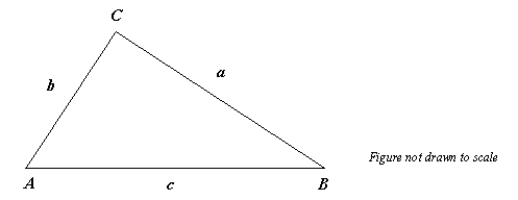
A) 9.25
B) 13.55
C) 17.84
D) 10.33
E) 11.40
 ,
,  , and
, and  , use the Law of Cosines to solve the triangle for the value of a. Round answer to two decimal places.
, use the Law of Cosines to solve the triangle for the value of a. Round answer to two decimal places. 
A) 9.25
B) 13.55
C) 17.84
D) 10.33
E) 11.40

Unlock Deck
Unlock for access to all 150 flashcards in this deck.
Unlock Deck
k this deck
23
Let w be a vector with initial point  and terminal point
and terminal point  . Write w as a linear combination of the standard unit vectors i and j.
. Write w as a linear combination of the standard unit vectors i and j.
A)
B)
C)
D)
E)
 and terminal point
and terminal point  . Write w as a linear combination of the standard unit vectors i and j.
. Write w as a linear combination of the standard unit vectors i and j.A)

B)

C)

D)

E)


Unlock Deck
Unlock for access to all 150 flashcards in this deck.
Unlock Deck
k this deck
24
A straight road makes an angle, A, of  with the horizontal. When the angle of elevation, B, of the sun is
with the horizontal. When the angle of elevation, B, of the sun is  , a vertical pole beside the road casts a shadow 6 feet long parallel to the road. Approximate the length of the pole. Round answer to two decimal places.
, a vertical pole beside the road casts a shadow 6 feet long parallel to the road. Approximate the length of the pole. Round answer to two decimal places. 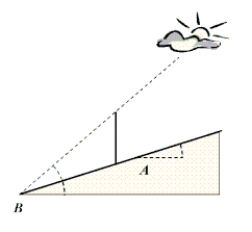
A) 4.28 feet
B) 1.97 feet
C) 5.26 feet
D) 9.60 feet
E) 8.41 feet
 with the horizontal. When the angle of elevation, B, of the sun is
with the horizontal. When the angle of elevation, B, of the sun is  , a vertical pole beside the road casts a shadow 6 feet long parallel to the road. Approximate the length of the pole. Round answer to two decimal places.
, a vertical pole beside the road casts a shadow 6 feet long parallel to the road. Approximate the length of the pole. Round answer to two decimal places. 
A) 4.28 feet
B) 1.97 feet
C) 5.26 feet
D) 9.60 feet
E) 8.41 feet

Unlock Deck
Unlock for access to all 150 flashcards in this deck.
Unlock Deck
k this deck
25
Given  ,
,  , and
, and  , use the Law of Sines to solve the triangle for the value of a. Round answer to two decimal places.
, use the Law of Sines to solve the triangle for the value of a. Round answer to two decimal places. 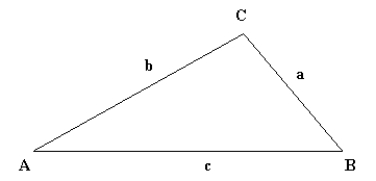
A)
B)
C)
D)
E)
 ,
,  , and
, and  , use the Law of Sines to solve the triangle for the value of a. Round answer to two decimal places.
, use the Law of Sines to solve the triangle for the value of a. Round answer to two decimal places. 
A)

B)

C)

D)

E)


Unlock Deck
Unlock for access to all 150 flashcards in this deck.
Unlock Deck
k this deck
26
Determine the area of a triangle having the following measurements. Round your answer to two decimal places. 
A) 76.18 sq. units
B) 114.27 sq. units
C) 95.23 sq. units
D) 104.75 sq. units
E) 85.70 sq. units

A) 76.18 sq. units
B) 114.27 sq. units
C) 95.23 sq. units
D) 104.75 sq. units
E) 85.70 sq. units

Unlock Deck
Unlock for access to all 150 flashcards in this deck.
Unlock Deck
k this deck
27
Determine the area of a triangle having the following measurements. Round your answer to two decimal places. 
A) 43.69 sq. units
B) 49.15 sq. units
C) 54.61 sq. units
D) 65.53 sq. units
E) 60.07 sq. units

A) 43.69 sq. units
B) 49.15 sq. units
C) 54.61 sq. units
D) 65.53 sq. units
E) 60.07 sq. units

Unlock Deck
Unlock for access to all 150 flashcards in this deck.
Unlock Deck
k this deck
28
In the figure below,  ,
,  , and
, and  . Use this information to solve the parallelogram for b. The diagonals of the parallelogram are represented by c and d. Round answer to two decimal places.
. Use this information to solve the parallelogram for b. The diagonals of the parallelogram are represented by c and d. Round answer to two decimal places. 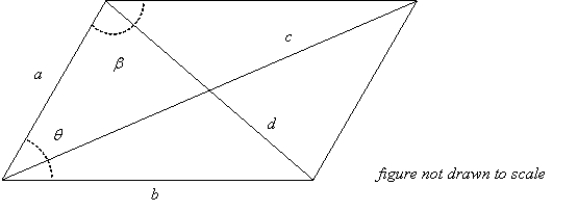
A) 15.33
B) 11.55
C) 13.44
D) 7.77
E) 12.02
 ,
,  , and
, and  . Use this information to solve the parallelogram for b. The diagonals of the parallelogram are represented by c and d. Round answer to two decimal places.
. Use this information to solve the parallelogram for b. The diagonals of the parallelogram are represented by c and d. Round answer to two decimal places. 
A) 15.33
B) 11.55
C) 13.44
D) 7.77
E) 12.02

Unlock Deck
Unlock for access to all 150 flashcards in this deck.
Unlock Deck
k this deck
29
Determine the area of a triangle having the following measurements. Round your answer to two decimal places. 
A) 34.18 sq. units
B) 37.29 sq. units
C) 27.97 sq. units
D) 31.07 sq. units
E) 24.86 sq. units

A) 34.18 sq. units
B) 37.29 sq. units
C) 27.97 sq. units
D) 31.07 sq. units
E) 24.86 sq. units

Unlock Deck
Unlock for access to all 150 flashcards in this deck.
Unlock Deck
k this deck
30
Find the component form of v if  and the angle it makes with the x-axis is
and the angle it makes with the x-axis is  .
.
A)
B)
C)
D)
E)
 and the angle it makes with the x-axis is
and the angle it makes with the x-axis is  .
.A)

B)

C)

D)

E)


Unlock Deck
Unlock for access to all 150 flashcards in this deck.
Unlock Deck
k this deck
31
In the figure below,  ,
,  , and
, and  . Use this information to solve the parallelogram for c. The diagonals of the parallelogram are represented by c and d. Round answer to two decimal places.
. Use this information to solve the parallelogram for c. The diagonals of the parallelogram are represented by c and d. Round answer to two decimal places. 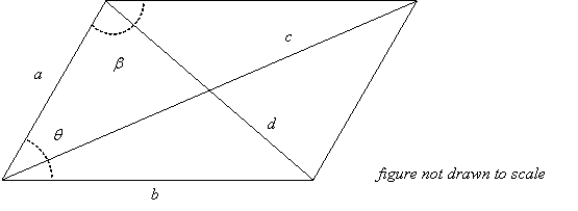
A) 10.00
B) 7.21
C) 10.93
D)
E) 12.17
 ,
,  , and
, and  . Use this information to solve the parallelogram for c. The diagonals of the parallelogram are represented by c and d. Round answer to two decimal places.
. Use this information to solve the parallelogram for c. The diagonals of the parallelogram are represented by c and d. Round answer to two decimal places. 
A) 10.00
B) 7.21
C) 10.93
D)

E) 12.17

Unlock Deck
Unlock for access to all 150 flashcards in this deck.
Unlock Deck
k this deck
32
In the figure below,  ,
,  , and
, and  . Use this information to solve the parallelogram for F . The diagonals of the parallelogram are represented by c and d. Round answer to two decimal places.
. Use this information to solve the parallelogram for F . The diagonals of the parallelogram are represented by c and d. Round answer to two decimal places. 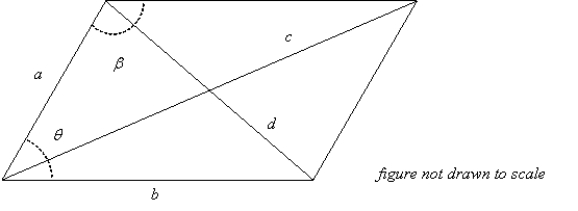
A)
B)
C)
D)
E)
 ,
,  , and
, and  . Use this information to solve the parallelogram for F . The diagonals of the parallelogram are represented by c and d. Round answer to two decimal places.
. Use this information to solve the parallelogram for F . The diagonals of the parallelogram are represented by c and d. Round answer to two decimal places. 
A)

B)

C)

D)

E)


Unlock Deck
Unlock for access to all 150 flashcards in this deck.
Unlock Deck
k this deck
33
Given  , use the Law of Sines to solve the triangle (if possible) for the value of c. If two solutions exist, find both. Round answer to two decimal places.
, use the Law of Sines to solve the triangle (if possible) for the value of c. If two solutions exist, find both. Round answer to two decimal places.
A)
B) not possible
C)
D)
E)
 , use the Law of Sines to solve the triangle (if possible) for the value of c. If two solutions exist, find both. Round answer to two decimal places.
, use the Law of Sines to solve the triangle (if possible) for the value of c. If two solutions exist, find both. Round answer to two decimal places.A)

B) not possible
C)

D)

E)


Unlock Deck
Unlock for access to all 150 flashcards in this deck.
Unlock Deck
k this deck
34
Given  ,
,  , and
, and  , use the Law of Sines to solve the triangle for the value of a. Round answer to two decimal places.
, use the Law of Sines to solve the triangle for the value of a. Round answer to two decimal places.
A)
B)
C)
D)
E)
 ,
,  , and
, and  , use the Law of Sines to solve the triangle for the value of a. Round answer to two decimal places.
, use the Law of Sines to solve the triangle for the value of a. Round answer to two decimal places.A)

B)

C)

D)

E)


Unlock Deck
Unlock for access to all 150 flashcards in this deck.
Unlock Deck
k this deck
35
Given  ,
,  , and
, and  , use the Law of Cosines to solve the triangle for the value of C. Round answer to two decimal places.
, use the Law of Cosines to solve the triangle for the value of C. Round answer to two decimal places.
A)
B)
C)
D)
E)
 ,
,  , and
, and  , use the Law of Cosines to solve the triangle for the value of C. Round answer to two decimal places.
, use the Law of Cosines to solve the triangle for the value of C. Round answer to two decimal places.A)

B)

C)

D)

E)


Unlock Deck
Unlock for access to all 150 flashcards in this deck.
Unlock Deck
k this deck
36
Given  ,
,  , and
, and  , use the Law of Cosines to solve the triangle for the value of C. Round answer to two decimal places.
, use the Law of Cosines to solve the triangle for the value of C. Round answer to two decimal places. 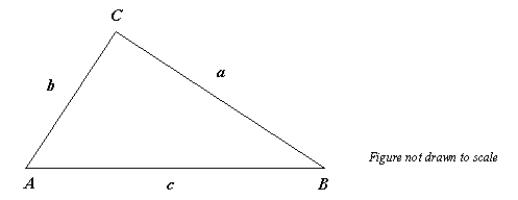
A)
B)
C)
D)
E)
 ,
,  , and
, and  , use the Law of Cosines to solve the triangle for the value of C. Round answer to two decimal places.
, use the Law of Cosines to solve the triangle for the value of C. Round answer to two decimal places. 
A)

B)

C)

D)

E)


Unlock Deck
Unlock for access to all 150 flashcards in this deck.
Unlock Deck
k this deck
37
Given  ,
,  , and
, and  , use the Law of Cosines to solve the triangle for the value of A. Round answer to two decimal places.
, use the Law of Cosines to solve the triangle for the value of A. Round answer to two decimal places.
A)
B)
C)
D)
E)
 ,
,  , and
, and  , use the Law of Cosines to solve the triangle for the value of A. Round answer to two decimal places.
, use the Law of Cosines to solve the triangle for the value of A. Round answer to two decimal places.A)

B)

C)

D)

E)


Unlock Deck
Unlock for access to all 150 flashcards in this deck.
Unlock Deck
k this deck
38
Given  ,
,  , and
, and  , use the Law of Cosines to solve the triangle for the value of c. Round answer to two decimal places.
, use the Law of Cosines to solve the triangle for the value of c. Round answer to two decimal places.
A) 13.27
B) 9.13
C) 14.65
D) 13.96
E) 11.89
 ,
,  , and
, and  , use the Law of Cosines to solve the triangle for the value of c. Round answer to two decimal places.
, use the Law of Cosines to solve the triangle for the value of c. Round answer to two decimal places.A) 13.27
B) 9.13
C) 14.65
D) 13.96
E) 11.89

Unlock Deck
Unlock for access to all 150 flashcards in this deck.
Unlock Deck
k this deck
39
Given  ,
,  , and
, and  , use the Law of Cosines to solve the triangle for the value of A. Round answer to two decimal places.
, use the Law of Cosines to solve the triangle for the value of A. Round answer to two decimal places. 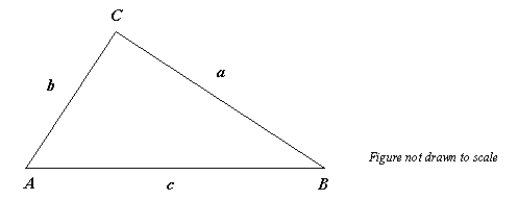
A)
B)
C)
D)
E)
 ,
,  , and
, and  , use the Law of Cosines to solve the triangle for the value of A. Round answer to two decimal places.
, use the Law of Cosines to solve the triangle for the value of A. Round answer to two decimal places. 
A)

B)

C)

D)

E)


Unlock Deck
Unlock for access to all 150 flashcards in this deck.
Unlock Deck
k this deck
40
Given  ,
,  , and
, and  , use the Law of Cosines to solve the triangle for the value of B. Round answer to two decimal places.
, use the Law of Cosines to solve the triangle for the value of B. Round answer to two decimal places.
A)
B)
C)
D)
E)
 ,
,  , and
, and  , use the Law of Cosines to solve the triangle for the value of B. Round answer to two decimal places.
, use the Law of Cosines to solve the triangle for the value of B. Round answer to two decimal places.A)

B)

C)

D)

E)


Unlock Deck
Unlock for access to all 150 flashcards in this deck.
Unlock Deck
k this deck
41
Given  and
and  , determine
, determine  .
.
A)
B)
C)
D)
E)
 and
and  , determine
, determine  .
.A)

B)

C)

D)

E)


Unlock Deck
Unlock for access to all 150 flashcards in this deck.
Unlock Deck
k this deck
42
Given  ,
,  , and
, and  , use the Law of Sines to solve the triangle for the value of a. Round answer to two decimal places.
, use the Law of Sines to solve the triangle for the value of a. Round answer to two decimal places. 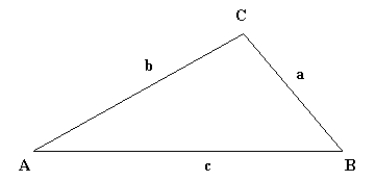
A)
B)
C)
D)
E)
 ,
,  , and
, and  , use the Law of Sines to solve the triangle for the value of a. Round answer to two decimal places.
, use the Law of Sines to solve the triangle for the value of a. Round answer to two decimal places. 
A)

B)

C)

D)

E)


Unlock Deck
Unlock for access to all 150 flashcards in this deck.
Unlock Deck
k this deck
43
Determine the area of a triangle having the following measurements. Round your answer to two decimal places. 
A) 30.00 sq. units
B) 27.00 sq. units
C) 33.00 sq. units
D) 36.00 sq. units
E) 24.00 sq. units

A) 30.00 sq. units
B) 27.00 sq. units
C) 33.00 sq. units
D) 36.00 sq. units
E) 24.00 sq. units

Unlock Deck
Unlock for access to all 150 flashcards in this deck.
Unlock Deck
k this deck
44
Find the magnitude of vector v with initial point  and terminal point
and terminal point  .
.
A)
B)
C)
D)
E)
 and terminal point
and terminal point  .
.A)

B)

C)

D)

E)


Unlock Deck
Unlock for access to all 150 flashcards in this deck.
Unlock Deck
k this deck
45
Let w be a vector with initial point  and terminal point
and terminal point  . Write w as a linear combination of the standard unit vectors i and j.
. Write w as a linear combination of the standard unit vectors i and j.
A)
B)
C)
D)
E)
 and terminal point
and terminal point  . Write w as a linear combination of the standard unit vectors i and j.
. Write w as a linear combination of the standard unit vectors i and j.A)

B)

C)

D)

E)


Unlock Deck
Unlock for access to all 150 flashcards in this deck.
Unlock Deck
k this deck
46
Given  ,
,  , and
, and  , use the Law of Cosines to solve the triangle for the value of B. Round answer to two decimal places.
, use the Law of Cosines to solve the triangle for the value of B. Round answer to two decimal places.
A)
B)
C)
D)
E)
 ,
,  , and
, and  , use the Law of Cosines to solve the triangle for the value of B. Round answer to two decimal places.
, use the Law of Cosines to solve the triangle for the value of B. Round answer to two decimal places.A)

B)

C)

D)

E)


Unlock Deck
Unlock for access to all 150 flashcards in this deck.
Unlock Deck
k this deck
47
Determine the area of a triangle having the following measurements. Round your answer to two decimal places. 
A) 68.17 sq. units
B) 61.36 sq. units
C) 54.54 sq. units
D) 81.81 sq. units
E) 74.99 sq. units

A) 68.17 sq. units
B) 61.36 sq. units
C) 54.54 sq. units
D) 81.81 sq. units
E) 74.99 sq. units

Unlock Deck
Unlock for access to all 150 flashcards in this deck.
Unlock Deck
k this deck
48
Find the component form of v if  and the angle it makes with the x-axis is
and the angle it makes with the x-axis is  .
.
A)
B)
C)
D)
E)
 and the angle it makes with the x-axis is
and the angle it makes with the x-axis is  .
.A)

B)

C)

D)

E)


Unlock Deck
Unlock for access to all 150 flashcards in this deck.
Unlock Deck
k this deck
49
Find the vector v that has a magnitude of  and is in the same direction as u, where
and is in the same direction as u, where  .
.
A)
B)
C)
D)
E)
 and is in the same direction as u, where
and is in the same direction as u, where  .
.A)

B)

C)

D)

E)


Unlock Deck
Unlock for access to all 150 flashcards in this deck.
Unlock Deck
k this deck
50
Given  and
and  , determine
, determine  .
.
A)
B)
C)
D)
E)
 and
and  , determine
, determine  .
.A)

B)

C)

D)

E)


Unlock Deck
Unlock for access to all 150 flashcards in this deck.
Unlock Deck
k this deck
51
Determine the area of a triangle having the following measurements. Round your answer to two decimal places. 
A) 43.69 sq. units
B) 36.41 sq. units
C) 29.12 sq. units
D) 32.77 sq. units
E) 40.05 sq. units

A) 43.69 sq. units
B) 36.41 sq. units
C) 29.12 sq. units
D) 32.77 sq. units
E) 40.05 sq. units

Unlock Deck
Unlock for access to all 150 flashcards in this deck.
Unlock Deck
k this deck
52
Given  ,
,  , and
, and  , use the Law of Sines to solve the triangle for the value of a. Round answer to two decimal places.
, use the Law of Sines to solve the triangle for the value of a. Round answer to two decimal places.
A)
B)
C)
D)
E)
 ,
,  , and
, and  , use the Law of Sines to solve the triangle for the value of a. Round answer to two decimal places.
, use the Law of Sines to solve the triangle for the value of a. Round answer to two decimal places.A)

B)

C)

D)

E)


Unlock Deck
Unlock for access to all 150 flashcards in this deck.
Unlock Deck
k this deck
53
Using the figure below, sketch a graph of the given vector. [The graphs in the answer choices are drawn to the same scale as the graph below.] ![<strong>Using the figure below, sketch a graph of the given vector. [The graphs in the answer choices are drawn to the same scale as the graph below.] </strong> A) B) C) D) none of these E)](https://storage.examlex.com/TB8632/11eb7c21_4269_b198_acd2_21b3b5d4255e_TB8632_00.jpg)
![<strong>Using the figure below, sketch a graph of the given vector. [The graphs in the answer choices are drawn to the same scale as the graph below.] </strong> A) B) C) D) none of these E)](https://storage.examlex.com/TB8632/11eb7c21_4269_b199_acd2_29b82bc46b18_TB8632_00.jpg)
A)![<strong>Using the figure below, sketch a graph of the given vector. [The graphs in the answer choices are drawn to the same scale as the graph below.] </strong> A) B) C) D) none of these E)](https://storage.examlex.com/TB8632/11eb7c21_4269_b19a_acd2_396a64f37f59_TB8632_11.jpg)
B)![<strong>Using the figure below, sketch a graph of the given vector. [The graphs in the answer choices are drawn to the same scale as the graph below.] </strong> A) B) C) D) none of these E)](https://storage.examlex.com/TB8632/11eb7c21_4269_b19b_acd2_591d8a9881ee_TB8632_11.jpg)
C)![<strong>Using the figure below, sketch a graph of the given vector. [The graphs in the answer choices are drawn to the same scale as the graph below.] </strong> A) B) C) D) none of these E)](https://storage.examlex.com/TB8632/11eb7c21_4269_b19c_acd2_13763eef300a_TB8632_11.jpg)
D) none of these
E)![<strong>Using the figure below, sketch a graph of the given vector. [The graphs in the answer choices are drawn to the same scale as the graph below.] </strong> A) B) C) D) none of these E)](https://storage.examlex.com/TB8632/11eb7c21_4269_d8ad_acd2_1fc8fa0c2da4_TB8632_11.jpg)
![<strong>Using the figure below, sketch a graph of the given vector. [The graphs in the answer choices are drawn to the same scale as the graph below.] </strong> A) B) C) D) none of these E)](https://storage.examlex.com/TB8632/11eb7c21_4269_b198_acd2_21b3b5d4255e_TB8632_00.jpg)
![<strong>Using the figure below, sketch a graph of the given vector. [The graphs in the answer choices are drawn to the same scale as the graph below.] </strong> A) B) C) D) none of these E)](https://storage.examlex.com/TB8632/11eb7c21_4269_b199_acd2_29b82bc46b18_TB8632_00.jpg)
A)
![<strong>Using the figure below, sketch a graph of the given vector. [The graphs in the answer choices are drawn to the same scale as the graph below.] </strong> A) B) C) D) none of these E)](https://storage.examlex.com/TB8632/11eb7c21_4269_b19a_acd2_396a64f37f59_TB8632_11.jpg)
B)
![<strong>Using the figure below, sketch a graph of the given vector. [The graphs in the answer choices are drawn to the same scale as the graph below.] </strong> A) B) C) D) none of these E)](https://storage.examlex.com/TB8632/11eb7c21_4269_b19b_acd2_591d8a9881ee_TB8632_11.jpg)
C)
![<strong>Using the figure below, sketch a graph of the given vector. [The graphs in the answer choices are drawn to the same scale as the graph below.] </strong> A) B) C) D) none of these E)](https://storage.examlex.com/TB8632/11eb7c21_4269_b19c_acd2_13763eef300a_TB8632_11.jpg)
D) none of these
E)
![<strong>Using the figure below, sketch a graph of the given vector. [The graphs in the answer choices are drawn to the same scale as the graph below.] </strong> A) B) C) D) none of these E)](https://storage.examlex.com/TB8632/11eb7c21_4269_d8ad_acd2_1fc8fa0c2da4_TB8632_11.jpg)

Unlock Deck
Unlock for access to all 150 flashcards in this deck.
Unlock Deck
k this deck
54
Given  ,
,  , and
, and  , use the Law of Cosines to solve the triangle for the value of C. Round answer to two decimal places.
, use the Law of Cosines to solve the triangle for the value of C. Round answer to two decimal places. 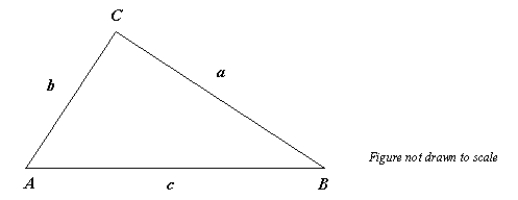
A)
B)
C)
D)
E)
 ,
,  , and
, and  , use the Law of Cosines to solve the triangle for the value of C. Round answer to two decimal places.
, use the Law of Cosines to solve the triangle for the value of C. Round answer to two decimal places. 
A)

B)

C)

D)

E)


Unlock Deck
Unlock for access to all 150 flashcards in this deck.
Unlock Deck
k this deck
55
Given  ,
,  , and
, and  , use the Law of Cosines to solve the triangle for the value of a. Round answer to two decimal places.
, use the Law of Cosines to solve the triangle for the value of a. Round answer to two decimal places. 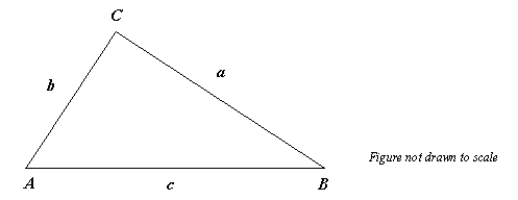
A) 12.33
B) 17.78
C) 13.69
D) 23.24
E) 15.06
 ,
,  , and
, and  , use the Law of Cosines to solve the triangle for the value of a. Round answer to two decimal places.
, use the Law of Cosines to solve the triangle for the value of a. Round answer to two decimal places. 
A) 12.33
B) 17.78
C) 13.69
D) 23.24
E) 15.06

Unlock Deck
Unlock for access to all 150 flashcards in this deck.
Unlock Deck
k this deck
56
A straight road makes an angle, A, of  with the horizontal. When the angle of elevation, B, of the sun is
with the horizontal. When the angle of elevation, B, of the sun is  , a vertical pole beside the road casts a shadow 6 feet long parallel to the road. Approximate the length of the pole. Round answer to two decimal places.
, a vertical pole beside the road casts a shadow 6 feet long parallel to the road. Approximate the length of the pole. Round answer to two decimal places. 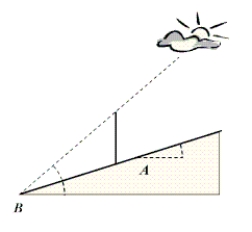
A) 3.49 feet
B) 6.31 feet
C) 5.71 feet
D) 8.26 feet
E) 4.15 feet
 with the horizontal. When the angle of elevation, B, of the sun is
with the horizontal. When the angle of elevation, B, of the sun is  , a vertical pole beside the road casts a shadow 6 feet long parallel to the road. Approximate the length of the pole. Round answer to two decimal places.
, a vertical pole beside the road casts a shadow 6 feet long parallel to the road. Approximate the length of the pole. Round answer to two decimal places. 
A) 3.49 feet
B) 6.31 feet
C) 5.71 feet
D) 8.26 feet
E) 4.15 feet

Unlock Deck
Unlock for access to all 150 flashcards in this deck.
Unlock Deck
k this deck
57
Find the magnitude of vector v. 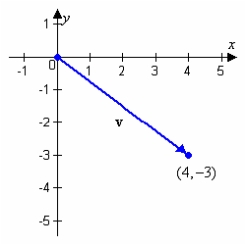

A)
B)
C)
D)
E)


A)

B)

C)

D)

E)


Unlock Deck
Unlock for access to all 150 flashcards in this deck.
Unlock Deck
k this deck
58
Given  ,
,  , and
, and  , use the Law of Cosines to solve the triangle for the value of C. Round answer to two decimal places.
, use the Law of Cosines to solve the triangle for the value of C. Round answer to two decimal places.
A)
B)
C)
D)
E)
 ,
,  , and
, and  , use the Law of Cosines to solve the triangle for the value of C. Round answer to two decimal places.
, use the Law of Cosines to solve the triangle for the value of C. Round answer to two decimal places.A)

B)

C)

D)

E)


Unlock Deck
Unlock for access to all 150 flashcards in this deck.
Unlock Deck
k this deck
59
Given  , use the Law of Sines to solve the triangle (if possible) for the value of c. If two solutions exist, find both. Round answer to two decimal places.
, use the Law of Sines to solve the triangle (if possible) for the value of c. If two solutions exist, find both. Round answer to two decimal places.
A)
B)
C)
D)
E) not possible
 , use the Law of Sines to solve the triangle (if possible) for the value of c. If two solutions exist, find both. Round answer to two decimal places.
, use the Law of Sines to solve the triangle (if possible) for the value of c. If two solutions exist, find both. Round answer to two decimal places.A)

B)

C)

D)

E) not possible

Unlock Deck
Unlock for access to all 150 flashcards in this deck.
Unlock Deck
k this deck
60
Given  ,
,  , and
, and  , use the Law of Cosines to solve the triangle for the value of A. Round answer to two decimal places.
, use the Law of Cosines to solve the triangle for the value of A. Round answer to two decimal places. 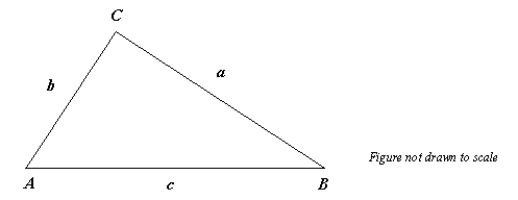
A)
B)
C)
D)
E)
 ,
,  , and
, and  , use the Law of Cosines to solve the triangle for the value of A. Round answer to two decimal places.
, use the Law of Cosines to solve the triangle for the value of A. Round answer to two decimal places. 
A)

B)

C)

D)

E)


Unlock Deck
Unlock for access to all 150 flashcards in this deck.
Unlock Deck
k this deck
61
In the figure below,  ,
,  , and
, and  . Use this information to solve the parallelogram for c. The diagonals of the parallelogram are represented by c and d. Round answer to two decimal places.
. Use this information to solve the parallelogram for c. The diagonals of the parallelogram are represented by c and d. Round answer to two decimal places. 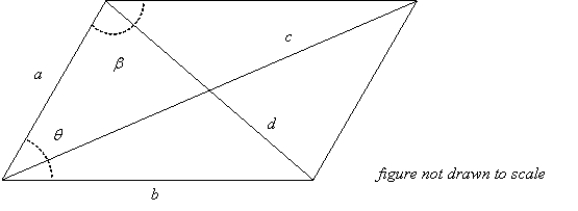
A)
B) 13.71
C) 12.25
D) 7.88
E) 11.16
 ,
,  , and
, and  . Use this information to solve the parallelogram for c. The diagonals of the parallelogram are represented by c and d. Round answer to two decimal places.
. Use this information to solve the parallelogram for c. The diagonals of the parallelogram are represented by c and d. Round answer to two decimal places. 
A)

B) 13.71
C) 12.25
D) 7.88
E) 11.16

Unlock Deck
Unlock for access to all 150 flashcards in this deck.
Unlock Deck
k this deck
62
Given  ,
,  , and
, and  , use the Law of Cosines to solve the triangle for the value of c. Round answer to two decimal places.
, use the Law of Cosines to solve the triangle for the value of c. Round answer to two decimal places.
A) 19.48
B) 16.84
C) 20.36
D) 13.33
E) 18.60
 ,
,  , and
, and  , use the Law of Cosines to solve the triangle for the value of c. Round answer to two decimal places.
, use the Law of Cosines to solve the triangle for the value of c. Round answer to two decimal places.A) 19.48
B) 16.84
C) 20.36
D) 13.33
E) 18.60

Unlock Deck
Unlock for access to all 150 flashcards in this deck.
Unlock Deck
k this deck
63
Let w be a vector with initial point  and terminal point
and terminal point  . Write w as a linear combination of the standard unit vectors i and j.
. Write w as a linear combination of the standard unit vectors i and j.
A)
B)
C)
D)
E)
 and terminal point
and terminal point  . Write w as a linear combination of the standard unit vectors i and j.
. Write w as a linear combination of the standard unit vectors i and j.A)

B)

C)

D)

E)


Unlock Deck
Unlock for access to all 150 flashcards in this deck.
Unlock Deck
k this deck
64
In the figure below,  ,
,  , and
, and  . Use this information to solve the parallelogram for . The diagonals of the parallelogram are represented by c and d. Round answer to two decimal places.
. Use this information to solve the parallelogram for . The diagonals of the parallelogram are represented by c and d. Round answer to two decimal places. 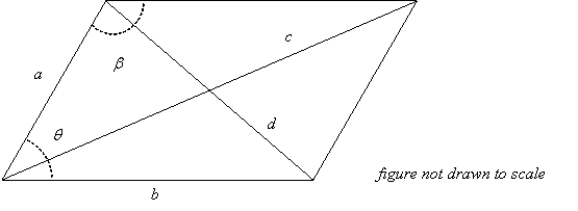
A)
B)
C)
D)
E)
 ,
,  , and
, and  . Use this information to solve the parallelogram for . The diagonals of the parallelogram are represented by c and d. Round answer to two decimal places.
. Use this information to solve the parallelogram for . The diagonals of the parallelogram are represented by c and d. Round answer to two decimal places. 
A)

B)

C)

D)

E)


Unlock Deck
Unlock for access to all 150 flashcards in this deck.
Unlock Deck
k this deck
65
Given vectors  and
and  determine the quantity indicated below.
determine the quantity indicated below. 
A) -6
B) -21
C) 36
D) -18
E) 78
 and
and  determine the quantity indicated below.
determine the quantity indicated below. 
A) -6
B) -21
C) 36
D) -18
E) 78

Unlock Deck
Unlock for access to all 150 flashcards in this deck.
Unlock Deck
k this deck
66
In the figure below,  ,
,  , and
, and  . Use this information to solve the parallelogram for b. The diagonals of the parallelogram are represented by c and d. Round answer to two decimal places.
. Use this information to solve the parallelogram for b. The diagonals of the parallelogram are represented by c and d. Round answer to two decimal places. 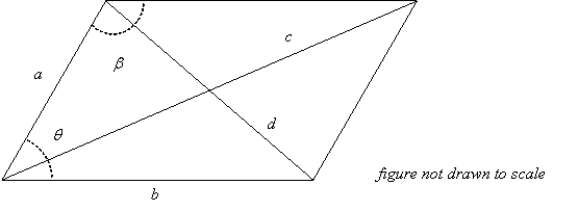
A) 6.79
B) 12.92
C) 14.97
D) 11.39
E) 10.88
 ,
,  , and
, and  . Use this information to solve the parallelogram for b. The diagonals of the parallelogram are represented by c and d. Round answer to two decimal places.
. Use this information to solve the parallelogram for b. The diagonals of the parallelogram are represented by c and d. Round answer to two decimal places. 
A) 6.79
B) 12.92
C) 14.97
D) 11.39
E) 10.88

Unlock Deck
Unlock for access to all 150 flashcards in this deck.
Unlock Deck
k this deck
67
Given  and
and  , determine
, determine  .
.
A)
B)
C)
D)
E)
 and
and  , determine
, determine  .
.A)

B)

C)

D)

E)


Unlock Deck
Unlock for access to all 150 flashcards in this deck.
Unlock Deck
k this deck
68
Find the vector v that has a magnitude of  and is in the same direction as u, where
and is in the same direction as u, where  .
.
A)
B)
C)
D)
E)
 and is in the same direction as u, where
and is in the same direction as u, where  .
.A)

B)

C)

D)

E)


Unlock Deck
Unlock for access to all 150 flashcards in this deck.
Unlock Deck
k this deck
69
Find the component form of v if  and the angle it makes with the x-axis is
and the angle it makes with the x-axis is  .
.
A)
B)
C)
D)
E)
 and the angle it makes with the x-axis is
and the angle it makes with the x-axis is  .
.A)

B)

C)

D)

E)


Unlock Deck
Unlock for access to all 150 flashcards in this deck.
Unlock Deck
k this deck
70
Given  ,
,  , and
, and  , use the Law of Cosines to solve the triangle for the value of A. Round answer to two decimal places.
, use the Law of Cosines to solve the triangle for the value of A. Round answer to two decimal places.
A)
B)
C)
D)
E)
 ,
,  , and
, and  , use the Law of Cosines to solve the triangle for the value of A. Round answer to two decimal places.
, use the Law of Cosines to solve the triangle for the value of A. Round answer to two decimal places.A)

B)

C)

D)

E)


Unlock Deck
Unlock for access to all 150 flashcards in this deck.
Unlock Deck
k this deck
71
Given  and
and  , determine
, determine  .
.
A)
B)
C)
D)
E)
 and
and  , determine
, determine  .
.A)

B)

C)

D)

E)


Unlock Deck
Unlock for access to all 150 flashcards in this deck.
Unlock Deck
k this deck
72
Find the angle between the vectors u and v. 

A)
B)
C)
D)
E)


A)

B)

C)

D)

E)


Unlock Deck
Unlock for access to all 150 flashcards in this deck.
Unlock Deck
k this deck
73
Using the figure below, sketch a graph of the given vector. [The graphs in the answer choices are drawn to the same scale as the graph below.] ![<strong>Using the figure below, sketch a graph of the given vector. [The graphs in the answer choices are drawn to the same scale as the graph below.] </strong> A) B) C) D) none of these E)](https://storage.examlex.com/TB8632/11eb7c21_4274_fcd0_acd2_0ff25c1a8a78_TB8632_00.jpg)
![<strong>Using the figure below, sketch a graph of the given vector. [The graphs in the answer choices are drawn to the same scale as the graph below.] </strong> A) B) C) D) none of these E)](https://storage.examlex.com/TB8632/11eb7c21_4274_fcd1_acd2_0d4723d754f5_TB8632_00.jpg)
A)![<strong>Using the figure below, sketch a graph of the given vector. [The graphs in the answer choices are drawn to the same scale as the graph below.] </strong> A) B) C) D) none of these E)](https://storage.examlex.com/TB8632/11eb7c21_4275_23e2_acd2_07764977033f_TB8632_11.jpg)
B)![<strong>Using the figure below, sketch a graph of the given vector. [The graphs in the answer choices are drawn to the same scale as the graph below.] </strong> A) B) C) D) none of these E)](https://storage.examlex.com/TB8632/11eb7c21_4275_23e3_acd2_9d8cdf2f0bc5_TB8632_11.jpg)
C)![<strong>Using the figure below, sketch a graph of the given vector. [The graphs in the answer choices are drawn to the same scale as the graph below.] </strong> A) B) C) D) none of these E)](https://storage.examlex.com/TB8632/11eb7c21_4275_23e4_acd2_9338b2c02ca3_TB8632_11.jpg)
D) none of these
E)![<strong>Using the figure below, sketch a graph of the given vector. [The graphs in the answer choices are drawn to the same scale as the graph below.] </strong> A) B) C) D) none of these E)](https://storage.examlex.com/TB8632/11eb7c21_4275_4af5_acd2_3bd4c56b51a8_TB8632_11.jpg)
![<strong>Using the figure below, sketch a graph of the given vector. [The graphs in the answer choices are drawn to the same scale as the graph below.] </strong> A) B) C) D) none of these E)](https://storage.examlex.com/TB8632/11eb7c21_4274_fcd0_acd2_0ff25c1a8a78_TB8632_00.jpg)
![<strong>Using the figure below, sketch a graph of the given vector. [The graphs in the answer choices are drawn to the same scale as the graph below.] </strong> A) B) C) D) none of these E)](https://storage.examlex.com/TB8632/11eb7c21_4274_fcd1_acd2_0d4723d754f5_TB8632_00.jpg)
A)
![<strong>Using the figure below, sketch a graph of the given vector. [The graphs in the answer choices are drawn to the same scale as the graph below.] </strong> A) B) C) D) none of these E)](https://storage.examlex.com/TB8632/11eb7c21_4275_23e2_acd2_07764977033f_TB8632_11.jpg)
B)
![<strong>Using the figure below, sketch a graph of the given vector. [The graphs in the answer choices are drawn to the same scale as the graph below.] </strong> A) B) C) D) none of these E)](https://storage.examlex.com/TB8632/11eb7c21_4275_23e3_acd2_9d8cdf2f0bc5_TB8632_11.jpg)
C)
![<strong>Using the figure below, sketch a graph of the given vector. [The graphs in the answer choices are drawn to the same scale as the graph below.] </strong> A) B) C) D) none of these E)](https://storage.examlex.com/TB8632/11eb7c21_4275_23e4_acd2_9338b2c02ca3_TB8632_11.jpg)
D) none of these
E)
![<strong>Using the figure below, sketch a graph of the given vector. [The graphs in the answer choices are drawn to the same scale as the graph below.] </strong> A) B) C) D) none of these E)](https://storage.examlex.com/TB8632/11eb7c21_4275_4af5_acd2_3bd4c56b51a8_TB8632_11.jpg)

Unlock Deck
Unlock for access to all 150 flashcards in this deck.
Unlock Deck
k this deck
74
Given  ,
,  , and
, and  , use the Law of Sines to solve the triangle for the value of a. Round answer to two decimal places.
, use the Law of Sines to solve the triangle for the value of a. Round answer to two decimal places. 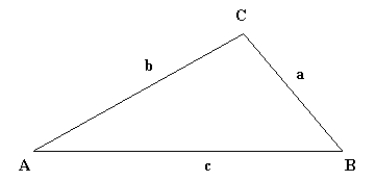
A)
B)
C)
D)
E)
 ,
,  , and
, and  , use the Law of Sines to solve the triangle for the value of a. Round answer to two decimal places.
, use the Law of Sines to solve the triangle for the value of a. Round answer to two decimal places. 
A)

B)

C)

D)

E)


Unlock Deck
Unlock for access to all 150 flashcards in this deck.
Unlock Deck
k this deck
75
Determine  where is the angle between u and v. Round answer to two decimal places.
where is the angle between u and v. Round answer to two decimal places.
A) 7.07
B) 5.00
C) 6.83
D) 8.66
E) 6.04
 where is the angle between u and v. Round answer to two decimal places.
where is the angle between u and v. Round answer to two decimal places.A) 7.07
B) 5.00
C) 6.83
D) 8.66
E) 6.04

Unlock Deck
Unlock for access to all 150 flashcards in this deck.
Unlock Deck
k this deck
76
Find the magnitude of vector v. 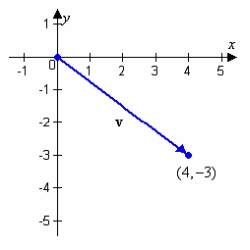

A)
B)
C)
D)
E)


A)

B)

C)

D)

E)


Unlock Deck
Unlock for access to all 150 flashcards in this deck.
Unlock Deck
k this deck
77
Find the magnitude of vector v with initial point  and terminal point
and terminal point  .
.
A)
B)
C)
D)
E)
 and terminal point
and terminal point  .
.A)

B)

C)

D)

E)


Unlock Deck
Unlock for access to all 150 flashcards in this deck.
Unlock Deck
k this deck
78
Determine the area of a triangle having the following measurements. Round your answer to two decimal places. 
A) 28.61 sq. units
B) 21.46 sq. units
C) 19.07 sq. units
D) 23.84 sq. units
E) 26.22 sq. units

A) 28.61 sq. units
B) 21.46 sq. units
C) 19.07 sq. units
D) 23.84 sq. units
E) 26.22 sq. units

Unlock Deck
Unlock for access to all 150 flashcards in this deck.
Unlock Deck
k this deck
79
Given that Force 1 = 70 pounds and Force 2 = 90 pounds, find the angle between the forces if the magnitude of the resultant force is 140 pounds. Round answer to the nearest degree.
A) 134°
B) 119°
C) 127°
D) 122°
E) 114°
A) 134°
B) 119°
C) 127°
D) 122°
E) 114°

Unlock Deck
Unlock for access to all 150 flashcards in this deck.
Unlock Deck
k this deck
80
Use the dot product to find the magnitude of u if 
A)
B)

C)
D)
E)

A)

B)


C)

D)

E)


Unlock Deck
Unlock for access to all 150 flashcards in this deck.
Unlock Deck
k this deck


